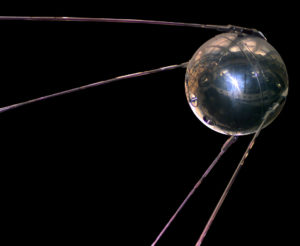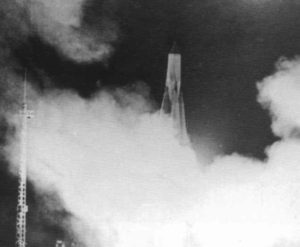60 years ago today, on October 4th, 1957, the Soviet Union launched the worlds first artificial satellite, Sputnik 1, using a slightly converted intercontinental Ballistic Missile.
This action shocked the United States – an enemy nation, the “backwards and primitive” Soviet Union, they had launched something into orbit before us? This, of course, couldn’t stand. We had to do better. We had to have our own satellites. We had to launch a man into space. We had to prove we were superior.

From 1957 onward, the United States and the Soviet Union pushed their missile technology forward – anything that could deliver a satellite into orbit can easily deliver a nuclear weapon to a target destination. Indeed, the usage of the R-7 missile to deliver Sputnik into orbit was only after it had completed a successful distance test flight – it was a functional weapons delivery system! Our missile technology had to improve, and a good way to test new developments, ironically, would be in the peaceful usage of the same booster technology for space research.
Sure, the United States would, after a spectacular failure, launch its own satellite on January 31st, 1958, and by 1965, begin surpassing the Soviet Union in the ensuing space race, but in these earliest of days the Soviet Union reigned supreme and the United States was playing catch up.

An image reported to be the launch of Sputnik 1, on a slightly modified R-7 missile.
The crazy thing? Sputnik 1 wasn’t even the originally planned payload – a much larger satellite, known as “Object D” was to be launched, but was delayed due to its complexity. It was later launched as Sputnik 3.
I actually wrote more about this subject last year – perhaps I should have saved the thoughts expressed then for this year? Who knows, but if you’re interested, here are those articles:
https://www.xadara.com/59-years-ago-sputnik-1/
https://www.xadara.com/the-sputnik-moment/
For added reading:
https://en.wikipedia.org/wiki/Sputnik_1
There is actually much more than can be said about Sputnik 1, but for now (in the interest of limited time) I’ll leave you with a few videos – one on our reaction to Sputnik at that time, and another one of curious facts relating to Sputnik.
